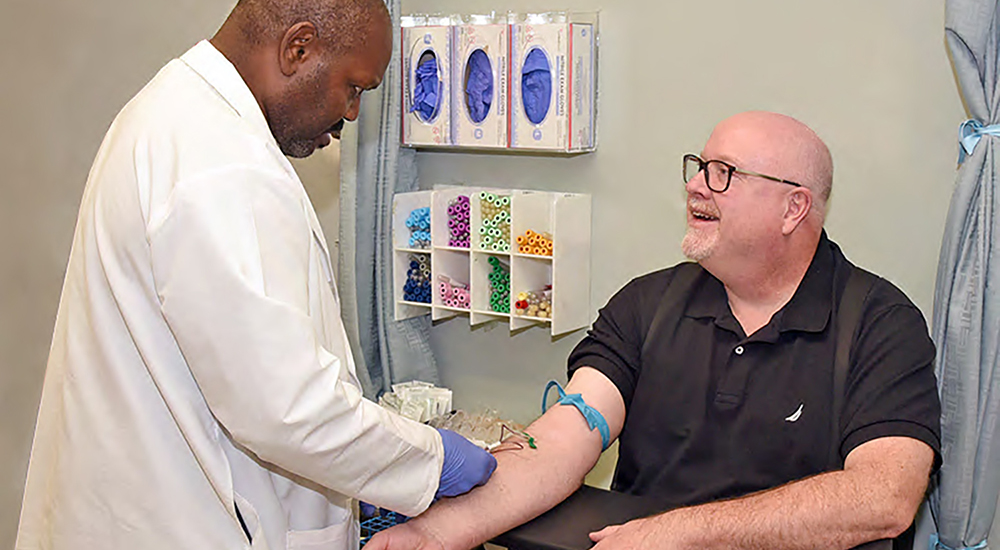The San Francisco VA Health Care System enrolled its 5,000th volunteer research participant in January in the national VA Million Veteran Program (MVP), which is building a genetic database to help research and develop new treatments for Veterans and non-Veterans alike.
In the photo above, Joe Shanks, a medical technician at the San Francisco VA Medical Center, draws a blood sample from Matt Parsons, Air Force Veteran, on Jan. 31 at the San Francisco VA Medical Center during enrollment in the MVP.
“We invite all Veteran employees and patients to join us.”
“This is a momentous occasion at the San Francisco VA and represents a remarkable collaboration between the research service and our clinical laboratory staff,” said Dr. Mary Whooley, site principal investigator for MVP at the San Francisco VA Health Care System.
“We invite all Veteran employees and patients to join us in this historic endeavor by enrolling in MVP. It’s quick and simple.”
The San Francisco VA Health Care System is one of 139 VA sites across the country where Veterans can enroll in MVP. Launched nationally in 2011, MVP is a landmark research effort aimed at better understanding how genes affect health. Data and genetic samples collected through the study are stored securely and made available for studies by authorized researchers, with stringent safeguards in place to protect Veterans’ private health information.
“Participating in this program gives me a chance to help other Veterans.”
While the program is exciting from a research standpoint, Veterans like Matt Parsons see it as a way to help other Veterans.
“I know how valuable research can be in the long run,” said Parsons, an Air Force Veteran, and San Francisco VA employee. “Participating in this program gives me a chance to help other Veterans get the best health care.”
With more than 700,000 enrollees to date nationally, MVP is now the largest database of its kind in the world—an integrated health and genomic database tied to a health care system. MVP provides researchers with a rich resource of genetic, health, lifestyle, and military-exposure data collected from questionnaires, medical records, and genetic analyses.
By combining this information into a single database, MVP promises to advance knowledge about the complex links between genes and health. Authorized researchers can use MVP data to help answer important questions on a wide range of health conditions affecting Veterans, from military-related conditions such as post-traumatic stress and traumatic brain injury to common chronic illnesses such as diabetes and heart disease.
Discoveries related to MVP also promise to advance the field of personalized medicine, which aims to tailor medical care based on a person’s individual genetic profile. Personalized medicine is expected to yield more effective treatments and reduce costs, given its emphasis on prevention.
To learn about the national MVP, visit www.research.va.gov/mvp, or call the MVP information center at 866-441-6075.

Topics in this story
More Stories
For a group of Veterans at the Central Virginia VA Health Care System, Parkinson’s care includes a regular check-in to see what they’ve built with Legos.
Daughter and son-in-law find a diary of her father's life as a prisoner of war written on toilet paper.
VA announces positive Veteran satisfaction feedback on telehealth services, including video visits, in the first half of fiscal 2025.






I joined the MVP program through the San Francisco VA (a/k/a ‘Ft. Miley’) about 2 years ago [first treated there in 2011 for lymphoma from Agent Orange] as a way to add to present and future medical knowledge and as a way to ‘pay it forward’ for subsequent generations. The overall aim seems to be finding what work for each individual, rather than ‘one size fits all’ treatment.
Not to brag, well, OK, we are bragging, but the South Texas VA has registered 16,500.